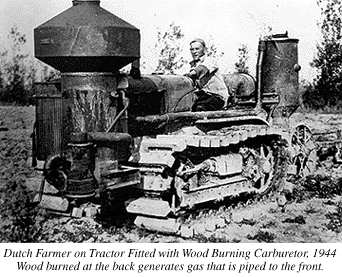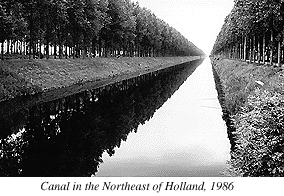
The Garbage Truck: For over four years the German Reich systematically emptied Holland of its agricultural produce, sending it across the border to Germany. By the winter of 1944-45, a particularly bitter cold season, finding sufficient food and heating fuel had become the primary concern for virtually the entire Dutch population. In Holland it is still called the "Hunger Winter." People in small towns like Huizen weren't quite as desperate as those in the cities, where many were dying of hunger and cold; they could keep small gardens, and fish in the Zuider Zee. Maintaining a hidden population of Jews, however, put a severe strain even on their relatively greater resources.
BERT BOCHOVE: Huizen had two garbage trucks: each one could handle 5,000 kilos--about five tons. During the war there wasn't much trash, so only one was in use. When you have only one newspaper--just a few pages now--you used it in the bathroom, or the stove. One truck was enough. In any case, there was no gasoline either.
We had an idea for that other garbage truck; we built an extra carburetor, so it could burn wood. As the wood burned down to charcoal, a gas formed that ran the engine. It worked so well, it didn't even take much fuel; you could put enough wood on top of a truck like that to last for five days.
In charge of that garbage truck was the director of the gas factory, and Johan Kappelhof, who was number two in Huizen's Distribution Office--he was in charge of all the scarce things. He did absolutely whatever he could to help people out. Whenever there was a newcomer--a Jew, or someone else who had to go underground--he got them a ration card; he supplied us with food cards for all the extra people in our house. He had such good contacts that if someone needed shoes, or something like that, you could go to him, and he would work on it. I had the feeling that helping out the Jews was much more important for him than his Distribution Office work.
Since we had invented the wood-burning carburetor, I asked him for the use of the truck to bring my pharmaceutical stuff from Amsterdam.
"No. You can find other ways," he said.
"But, we need it to get potatoes from the farms up north, too."
"Okay. That's different."
Kappelhof arranged for his assistant, a retired Dutch army officer, to provide us with all kinds of false papers, showing that we were driving for the Wehrmacht (German Army), and were allowed to stay out after curfew.
Kets de Vries was mixed up in this business, too. He arranged for Gerrit Veerman, a farm boy working in his textile factory, who was well acquainted with the wood-burning system, to be the driver. Gerrit was my age, around thirty-five, with a round, red, healthy face, though his hair was already white. In the village his nickname was Silver Gull. So we were all set to go out to the farmers, looking for 5,000 kilos of potatoes. Seems like a lot of potatoes, but when you consider all the Jews hiding in Huizen, some of them in situations where people could not give them enough to eat, it wasn't so much.
We took off for the first run. Along the road we saw a lot of people wrapped up in all kinds of shabby old clothes, trying to keep warm, some pushing baby carriages with a child or a little bit of food, or clothing. They were walking from farm to farm looking for food. But they had to spend such a long time on the road, they seldom came home with anything; they ate it on the way. The farmer we went to had a big place. He was a very good man. Because it was for the Jews who couldn't go for themselves, he filled up our truck.

The last trip--I'll never forget it--was the most unusual one ever. It was between Christmas and New Years' in the Hunger Winter. We arrived at a farm we had been to twice before, but this time we couldn't go in: the farmer had strung up barbed wire all around. We honked. When they saw it was us, they opened up and let us in.
"This time, I don't know if I can help you. I don't have much anymore. It's so hard," the farmer said.
Still, he wanted to help. Having nothing else, he decided to give us the small seed potatoes he had been saving to plant in the spring. They were stored for the winter in deep holes, covered with straw and earth. His farmhands had to dig them up for us, but we got our five tons.
"Don't worry. I'll get more from the other farmers' surplus. I can make it," he said.
I paid him 140 guilders--far, far less than you would pay in the store today. He could have sold those potatoes for hundreds of thousands of guilders, which some stinkers did, but he was a very fine man, a normal person.
When winter threshing was finished, his barn floor had been covered, as usual, with dirt, gravel, and chaff, but there was always a little bit wasted, and there was some grain mixed in there too. Because it was wartime and shortages, he had gathered it all up in bags, saving it for the hogs. When he showed it to us, we said, "Please, give it to us. We have hundreds of people around with plenty of time on their hands to sort it out." So we got eight or nine bags to take home, each one at least seventy-five pounds.
 We drove off with our load of potatoes and extra bags. With us this time was the director of an Amsterdam shipping company who was living in Huizen. He had to sit on the potatoes; I was sitting in front with Gerrit. For miles we were driving along side a famous canal, used in the old days for ships bound for Indonesia. The air was bitter cold. We had been on the road maybe an hour and a half when Gerrit said, "We'll get to a bridge pretty soon. On the other side live some relatives of mine. We can get a hot cup of coffee." I thought I would like that; besides, coffee was hard to come by. When he mentioned their name, I realized I had known a man from this family in Finland--Jaap Langendijk, a famous ice skater. So I wanted to meet them, too.
We drove off with our load of potatoes and extra bags. With us this time was the director of an Amsterdam shipping company who was living in Huizen. He had to sit on the potatoes; I was sitting in front with Gerrit. For miles we were driving along side a famous canal, used in the old days for ships bound for Indonesia. The air was bitter cold. We had been on the road maybe an hour and a half when Gerrit said, "We'll get to a bridge pretty soon. On the other side live some relatives of mine. We can get a hot cup of coffee." I thought I would like that; besides, coffee was hard to come by. When he mentioned their name, I realized I had known a man from this family in Finland--Jaap Langendijk, a famous ice skater. So I wanted to meet them, too.
Pretty soon Gerrit turned the truck on to the bridge. That very same moment, I saw the sign, "Weight Limit Three Tons." Oh God. We had five tons of potatoes, and a ton of other stuff.
That bridge was on pontoons, the whole business hanging from heavy poles with chains. We rolled on down. Halfway across, all of a sudden there was a lot of noise, and water flooded over the bridge floor. The moonlight shone through the clouds. We were hanging there.
"What now, Gerrit?"
I looked over and saw his undisturbed face.
"Well, we seem to be a little bit heavier than the thing was built for."
"All this work and all this food? How dumb!"
I was getting mad. He knew darned well that the bridge was not strong. But I couldn't stay mad; after all, it wasn't something he really wanted. So there we sat, with a lot of water under the truck.
In a very short time we heard the unmistakable sounds of marching feet, and singing; it had to be Germans. Only Germans would be singing--it was required. They came closer and closer, until Gerrit--who could barely read or write, but in his own way was very philosophical--shouted out in a tremendously loud voice, "Hey, there!"
It was a group of maybe twenty men with their sergeant. They stopped. Gerrit boomed out, "Over here!" And over they came. They had to; when they heard such a loud mouth, they would automatically do whatever they were ordered. Gerrit yelled to them again, "We drive for the Wehrmacht! We have to take these potatoes to Amsterdam! It will be pretty bad for you fellows if we don't get there!" They understood that. There was no question of being suspicious. They figured a fellow with such a big mouth must be somebody important.
"What do we do?" they asked.
"I'll start the motor, and you men get behind and push."
So all the fellows got behind the truck to push, and we stayed inside, and kept our feet dry. The way Gerritt handled those soldiers, he was not afraid of the Devil.